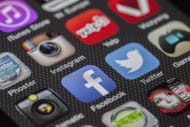The impact of smartphone usage on sleep and mental health is emerging as a growing concern. Devices such as smartphones or tablets have become constant companions in our daily lives, often being the first things we reach for in the morning and the last things we check before bed. Sure, they provide us with a wealth of information, entertainment, and connectivity, but at what cost?
In this article, we explain how to mitigate the negative impact of smartphone usage and maximize its benefits.
Smartphone vs sleep
Let's start with sleep. Have you ever found yourself scrolling through social media or binge-watching Netflix in bed, only to find yourself struggling to fall asleep?
You're not alone. The blue light emitted by smartphones and other electronic devices can suppress the production of melatonin, a hormone that helps regulate sleep. This can make it harder to fall asleep and lead to more fragmented sleep.
Not to mention, the constant notifications and alerts that come with smartphone usage can disrupt sleep and make it harder to stay asleep once you do manage to drift off.
But it's not just the physical impact of smartphone usage that can impact sleep; the content we consume on our phones can also have an effect. Scrolling through social media or reading news articles can be mentally stimulating, making it harder to relax and fall asleep.
Additionally, some people may experience stress or anxiety as a result of the content they consume on their phones, which can also disrupt sleep.
Smartphone vs mental health
Sleep isn't the only area where smartphone users can have a negative impact. Mental health is also a concern. Excessive smartphone usage has been linked to many mental health problems, including depression, anxiety, and stress. So, what is it about smartphones that can lead to these issues?
For starters, smartphone use can lead to feelings of social isolation and loneliness. While social media can provide a sense of connection and community, it can also lead to feelings of inadequacy and FOMO (fear of missing out) as people compare themselves to others. This can contribute to feelings of depression and anxiety.
Another factor that can impact mental health is the constant barrage of notifications and alerts that come with smartphone usage. These notifications can create a sense of urgency and stress, thus contributing to increased anxiety, stress, and decreased well-being.
But there are ways to mitigate the negative impact of smartphone usage on mental health. One solution is to seek support from a mental health professional. Therapy can help you develop coping strategies and address underlying issues that may be contributing to your smartphone use.
Additionally, using apps to track screen time and set usage limits can help you become more aware of how much time you're spending on your phone, and potentially reduce your usage.
Tips for mitigating the impact of smartphone usage
Aside from the aforementioned methods, here are some more ways to lessen the negative impact of smartphone usage on sleep and mental health:
- Set limits on your smartphone usage, especially in the hours before bedtime. Consider turning off notifications or setting your phone to "do not disturb" mode during these times.
- Develop a bedtime routine that does not involve smartphone usage. This can include activities such as reading a book, taking a bath, or practicing relaxation techniques.
- There are many apps available that can help improve sleep and reduce the negative impact of smartphone usage. For example, apps that filter blue light can help regulate the production of melatonin and improve sleep, while apps that track screen time can help you become more aware of how much time you spend on your phone.
- If you are struggling with mental health issues related to smartphone usage, seek support from a mental health professional. Therapy can help you develop coping strategies and address underlying issues that may be contributing to your smartphone use.
- Take a break from social media and other digital distractions for a whole day. Use the time to connect with friends and family face-to-face, go for a walk in nature, or try a new hobby.

It's important to note that smartphones aren't inherently bad for us. They provide countless benefits, including staying connected with loved ones, accessing important information, and even improving our mental health through apps promoting mindfulness and self-care. But like everything else, moderation is key.
By setting boundaries, establishing healthy habits, and seeking support when needed, we can maximize the benefits of smartphone usage while mitigating the negative effects on sleep and mental health.
Remember, it's all about finding a balance that works for you. By taking proactive steps to reduce the impact of smartphone usage, you can improve your sleep quality and overall mental well-being.
